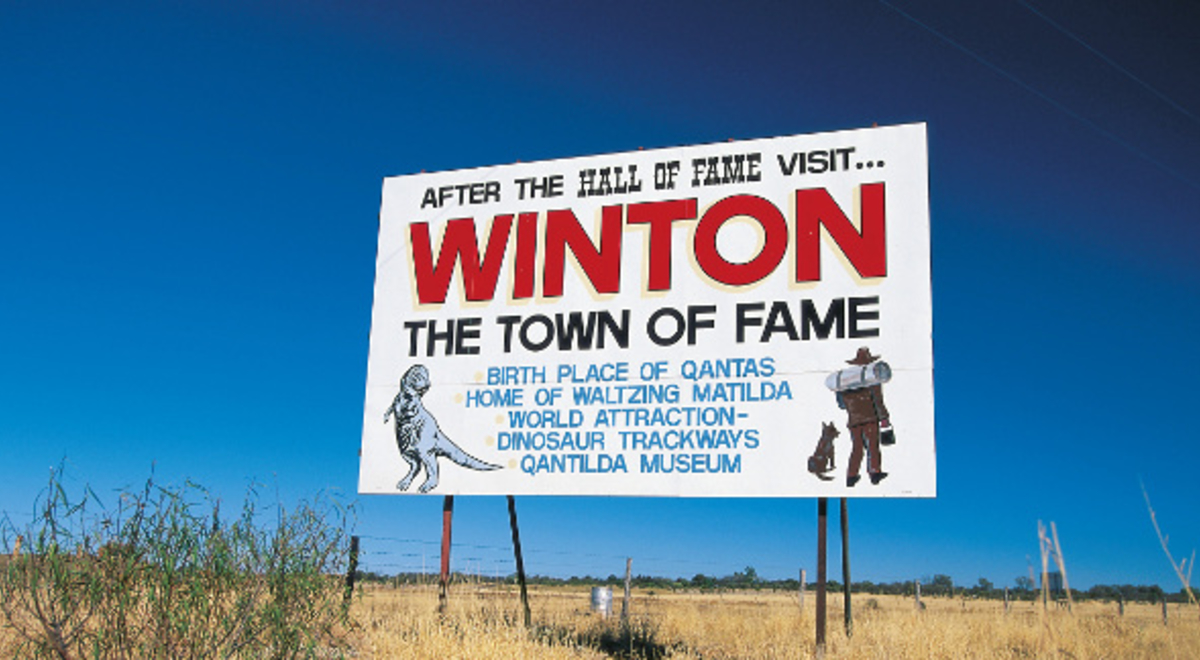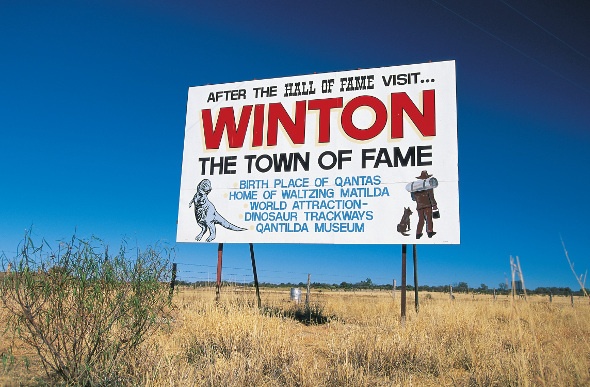
A man can get lucky, mustering stock in the backblocks of western Queensland.
Farmer David Elliott did in 1999 when, rounding up sheep by motorbike on his property near Winton in the central western Outback, he spotted what was clearly a fossilised bone sticking out of the ground. It turned out to be the thigh-bone of a 95-million-year old dinosaur that had weighed 25 tonnes.

Almost four decades before, to the south-west of Winton, the chance discovery of a fossilised dinosaur footprint would end with scientists unearthing thousands more and compelling evidence of a unique dinosaur stampede; around that time, in 1963, Muttaburra local Doug Langdon, mustering cattle on horseback, found a pile of bones that would put his name in the science books and his town on the world palaeontology map.
Major dinosaur finds in Queensland until recently were almost always serendipitous, but there has been nothing accidental about how these discoveries have been wrapped up and sold to the travelling public as one of the most compelling reasons to visit the Queensland Outback.
Much of the central Outback was an ancient inland sea and the region and its periphery are rich in the fossil remains of marine and terrestrial animals.
Australia's Dinosaur Trail
The main sites, in a region popularly known as 'Dinosaur Country', are Hughenden and Richmond, on the Flinders Highway (Overlanders Way), and Winton, about 220 kilometres south-west of Hughenden.
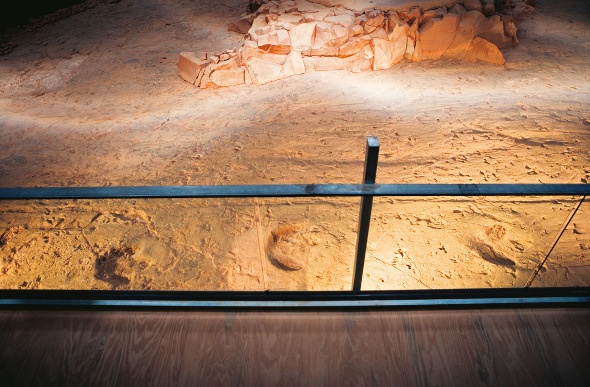
Together, these three centres, each with its own dedicated fossil and dinosaur tourist attractions, comprise what is marketed as Australia’s Dinosaur Trail.
The roughly triangular circuit, approached from the east, starts at Hughenden, about 380 kilometres from Townsville.
The Outback doesn't end here. Outback Adventures In The West
Want more Queensland adventure? What’s On The Ultimate Queensland Bucket List?
It was near here in 1865 that the first recorded discovery of ancient fossilised remains was made in Queensland – a marine reptile called an Ichthyosaur.
Later, more remains, including the skull of a marine carnivore, Kronosaurus, were found. Hughenden’s Flinders Discovery Centre has a rich fossil collection that includes marine reptiles, parts of a Queensland pterosaur (flying reptile) and a full-scale replica of the sauropod (long-necked plant eater), known after Doug Langdon’s 1963 discovery as Muttaburrasaurus.
About 110 kilometres to the west, Richmond’s Kronosaurus Korner has an extensive collection of marine reptile and dinosaur fossils. It became the pre-eminent fossil site in Queensland after 1989, when Richmond district brothers Ian and Rob Ivers found a plesiosaur (marine reptile), on their family property.
A few months later, they found more bones and, later still, a sauropod – one of the largest creatures to have walked the planet. Years of hard work has turned Kronosaurus Korner into an impressive museum and specialised research facility which offers visitors the chance to watch scientists at work and, by arrangement, join them in it.
The Great Dinosaur Stampede
David Elliott’s discovery of the dinosaur, later named 'Elliot', near Winton in 1999 was to change the tourism balance in Dinosaur Country. By then, the Lark Quarry dinosaur stampede site was already a must-see for travellers, but Elliott’s discovery began to gather serious momentum, helped by his own enthusiasm and significant and ongoing input by Queensland Museum scientists.
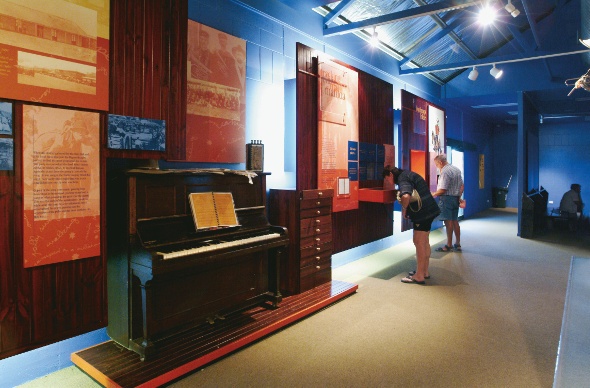
In the past few years, many more remains of huge sauropods and other dinosaurs have been found in the Winton regio, and scientists, who are conducting an ongoing and targeted digging program, believe this is just the tip of the iceberg. Recent discoveries include Australovenator wintonensis, which is the largest carnivorous dinosaur yet found in Australia.
David Elliott used to keep his dinosaur bone collection and operate a research laboratory in his motorbike shed; now, it’s housed in a superb facility on the outskirts of Winton called Australian Age of Dinosaurs Museum of Natural History.
Located at the top of a jump-up (mesa) above rolling Mitchell grass downs about a 25-minute drive from Winton, this facility is simply wonderful. It not only looks the part in its ancient landscape – due to the design and the local, natural materials used to construct it – but it also achieves a great balance between display and research.
You can see original dinosaur skeletons including those of Elliot and another massive, long-necked creature called Diamantinasaurus matildae, and the carnivorous Astralovenator, in the collections room. Guided tours are enhanced considerably by audio visuals and a well-produced introductory movie.
Join A Dinosaur Dig
The great appeal of Australian Age of Dinosaurs, however, is the chance it gives to visitors to get involved. Want to join a dig for more dinosaurs? You can arrange it here. Fancy working on 95 million-year-old bones as a volunteer in the on-site fossil laboratory? No problems – join the museum’s Prep-A-Dino program and spend a few days doing something memorable in the Outback.
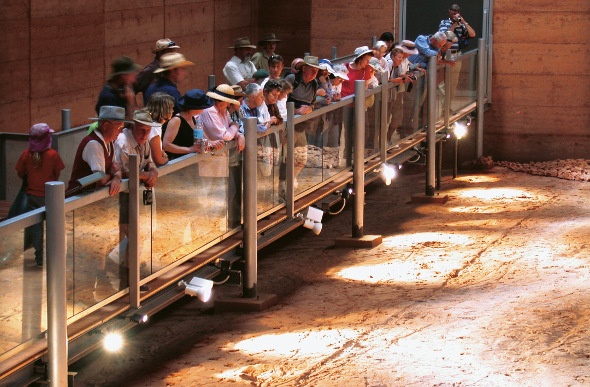
All this, and especially the hands-on element, has helped put Winton at the top of the heap in dinosaur tourism. If you get on the Dinosaur Trail here or elsewhere (there is a discounted pass for all the region’s main attractions, including the Dinosaur Stampede at Lark Quarry), you may well find it the most rewarding holiday experience you’ve had.
Visit your local Flight Centre or call 131 600 for more travel advice and the latest travel deals.



